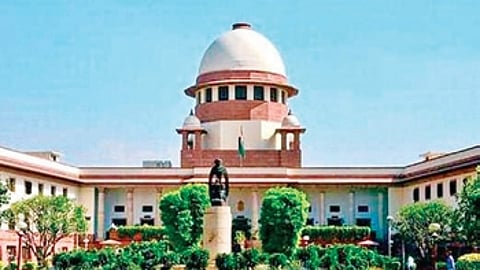

HYDERABAD: The Supreme Court on Monday quashed all GOs issued by the YS Rajasekhara Reddy government regarding allotment of house sites to MPs, MLAs, All India Service officers and journalists.
The orders, by a bench headed by Chief Justice of India Sanjay Khanna said: “GO Nos. 419, 420, 422 to 425 dated March 25, 2008, and GO No 551 dated March 27, 2008, are declared to be bad in law, being violative of Article 14 of the Constitution, and are quashed by issuing a Writ of Certiorari”.
The order also stated that the interim directions passed by the apex court in some of these cases now stand merged with the final direction. “Parties will be accordingly bound by the same,” it said.
The interim orders allowed housing cooperative societies of MPs, MLAs, AIS officers and journalists — Indira Legislators Mutually Aided Cooperative Housing Society Limited, Adarshnagar Mutually Aided Cooperative Housing Society, Indian Revenue Service Officers and Jawaharlal Nehru Journalists Mutually Aided Cooperative Housing Society — to develop the land subject to the final judgment of the Supreme Court.
The bench directed the state government to refund the entire amount deposited by them, including the stamp duty and the registration fee, along with interest.
Entire amount to be refunded by TG: SC
In the final judgment delivered on Monday, the apex court said: “We also deem it appropriate to pass an order of restitution and direct that the cooperative societies and their members, as the case may be, will be entitled to a refund of the entire amount deposited by them, including the stamp duty and the registration fee paid by them, along with the interest which may be quantified by the State of Telangana. The rate of interest will not exceed the Reserve Bank of India’s rate of interest applicable from time to time, as may be deemed fit by the State of Telangana.”
It continued: “The lease deeds executed by the State of Telangana in favour of the societies/members will be treated as cancelled. Similarly, development charges/expenses paid by the cooperative societies/members, as reflected in the books of accounts of the cooperative societies /members, duly certified by the Income-Tax returns, will be refunded to them along with interest at the rates specified”.
The apex court further declared that it will be open to the state government to deal with the land in the manner it deems fit and proper and as per law, keeping in mind the observations and findings recorded in the judgment. “Appeals and the contempt petitions are accordingly disposed of and all pending applications also stand disposed of,” the order said.
Journalists not entitled to preferential treatment
The court observed that the accredited journalists cannot be treated as a separate class for such preferential treatment. “In fact, a careful study of the policy indicates that higher echelons of all the three wings of the government — legislators, bureaucrats, and judges of the Supreme Court and High Courts — have been accorded such preferential treatment.
Journalists, who are considered the fourth pillar of democracy, have also been included. These four pillars of democracy are expected to act as checks and balances on the arbitrary exercise of the State’s power. However, the distribution of such extraordinary State benefits renders nugatory the very optics of healthy checks and balances within our democratic system,” the court observed.
“Thus, the core framework of these policies suffers from the malaise of unreasonableness and arbitrariness. It reeks of colourable exercise of power whereby the policymakers are bestowing valuable resources to their peers and ilk, triggering a cycle of illegal distribution of State resources. The State holds all its resources in trust for its citizens, to be utilised in larger public and social interest. The State, including the three organs — Legislature, Executive and the Judiciary — are de facto trustees and agents/repositories which function and govern for the benefit of the citizens who are the beneficiaries,” the court observed.
The apex court also noted: “... members of the AIS have asserted that they are “underprivileged”, or have made “sacrifices”, which entitles them to the privilege of preferential land allotment at a discounted rate. We reject this argument as fallacious and untenable. Government servants, elected legislators, judges in the Supreme Court and High Court, and prominent journalists do not belong to the “weaker” or per se deserving sections of our society, warranting special State reservations to land allotment”.